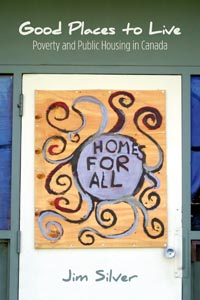Jim Silver’s latest, Good Places to Live, presents an unequivocal argument against the trend towards demolition of public housing projects and sale of these properties to private-sector developers. Pulling no punches, Silver characterizes such acts as a transfer of wealth from the poor to the already wealthy, and demonstrates the role of neo-liberalism in displacing the poor and furthering the current housing crisis.
For housing activists, this argument may not seem to be anything more than a restatement of what they already know. But in Good Places to Live, Silver broadens the terrain, clarifying the systemically and sometimes overtly racialized nature of this wealth transfer, and delivers a sound thrashing of assumptions, misapprehensions and the stigma attached to poverty.
Moreover, Silver is expert at participatory research, a model he has used time and time again in dozens of studies and a number of his books. This means the reader is not just shown the facts, but is confronted with the voices of the very persons whom those facts represent. The sum is almost a docudrama of current history — an engaging telling of the importance of public housing developments to the persons who live in them, the success of these public programs, and an enunciation in plain language of the effects public housing projects (and their loss) have on real people.
The reader need not have any specialized knowledge of housing issues to appreciate the weight of this message, or the nuances of the often subtle arguments that might – in the hands of another academic — be unavailable to lay persons. With Good Places to Live, Silver gifts us with a read that is more entertaining (in the sense of being riveting) and human-scale than much of what we tend to think of as great literature. And importantly, he informs us of and prepares us for one of today’s most significant but often ignored public policy debates.
That, in a nutshell, qualifies Good Places to Live as an essential read. A masterwork.
Silver, of course, is not new to publishing his research. One of Canada’ hardest-working unsung heroes, he has authored, co-authored, edited and co-edited countless books and research papers, and is the founding Chair of the Canadian Centre for Policy Alternatives. Significantly, in doing his research, he not only engages with various communities, he involves himself fully with community members in improving their neighbourhoods and establishing the empowering and sustaining services that each community needs. This aspect of his work is not mentioned in any book, but is credited entirely to the community members — a humblety that reflects Silver’s Freirean principles.
When considering the impact of a book like Good Places to Live, a compelling understory and unintended message — only indicated in descriptions of the transformative programming put in place — is that Silver truly and certainly “walks the walk.” Here, between the lines of Good Places to Live, we have an inspirational figure who goes well beyond the simple “do something good” message. Instead, Silver silently offers that we can all, working diligently and together to rebuld communities “from within,” change the world ourselves. This is itself a powerful and moving message.
Good Places to Live stands as a clear warning to anyone engaged in public policy debates that the housing turf war is re-declared, and the “turf” is not just a few properties here and there, or hundreds of family units in one or another community, but hundreds of thousands of family homes across Canada — often involving the most vulnerable and marginalized families. It’s a battle of tremendous significance, and to be sure, it is a battle that Jim Silver aims to help these communities win.
Be warned. You will not think the same way about academic research again. And enjoy reading.
David Henry is a graphic artist and still-aspiring writer, as well as a community activist and amateur historian/philosopher. He lives quite cheerfully in Winnipeg’s poorest inner-city districts. Full disclosure: Henry is Jim Silver’s son-in-law.
rabble.ca is a reader-supported site — we count on donations from people like you. Please join us as a paying member (click here) or send a one-off donation (click here) to help us continue our work.



